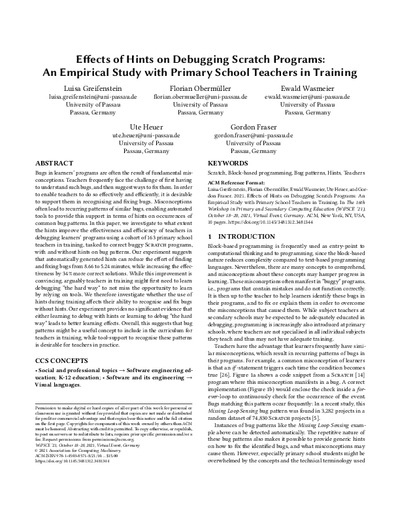Effects of Hints on Debugging Scratch ProgramsAn Empirical Study with Primary School Teachers in Training
Publikationsdatum:
Zu finden in: WiPSCE '21, 2021
|
 |
 Diese Seite wurde seit 2 Jahren inhaltlich nicht mehr aktualisiert.
Unter Umständen ist sie nicht mehr aktuell.
Diese Seite wurde seit 2 Jahren inhaltlich nicht mehr aktualisiert.
Unter Umständen ist sie nicht mehr aktuell.
 Zusammenfassungen
Zusammenfassungen



Bugs in learners’ programs are often the result of fundamental misconceptions. Teachers frequently face the challenge of first having to understand such bugs, and then suggest ways to fix them. In order to enable teachers to do so effectively and efficiently, it is desirable to support them in recognising and fixing bugs. Misconceptions often lead to recurring patterns of similar bugs, enabling automated tools to provide this support in terms of hints on occurrences of common bug patterns. In this paper, we investigate to what extent the hints improve the effectiveness and efficiency of teachers in debugging learners’ programs using a cohort of 163 primary school teachers in training, tasked to correct buggy programs, with and without hints on bug patterns. Our experiment suggests that automatically generated hints can reduce the effort of finding and fixing bugs from 8.66 to 5.24 minutes, while increasing the effectiveness by 34% more correct solutions. While this improvement is convincing, arguably teachers in training might first need to learn debugging “the hard way” to not miss the opportunity to learn by relying on tools. We therefore investigate whether the use of hints during training affects their ability to recognise and fix bugs without hints. Our experiment provides no significant evidence that either learning to debug with hints or learning to debug “the hard way” leads to better learning effects. Overall, this suggests that bug patterns might be a useful concept to include in the curriculum for teachers in training, while tool-support to recognise these patterns is desirable for teachers in practice.
 Dieses Konferenz-Paper erwähnt ...
Dieses Konferenz-Paper erwähnt ...
 Personen KB IB clear | Bryce Boe , Phillip Conrad , Austin Cory Bart , Greg Dreschler , Erica Eddy , Jeremy Ernst , Diana Franklin , Luke Gusukuma , Stuart Hansen , Felienne Hermans , Charlotte Hill , Joseph Jay Williams , Dennis G. Kafura , Manu Kapur , Michelle Len , Samiha Marwan , Jesús Moreno-León , Thomas W. Price , Gregorio Robles , Marileen Smit , Juha Sorva , Alaaeddin Swidan | |||||||||||||||||||||||||||||||||||||||||||||||||||||||||||||||||||||||||||||||||
 Begriffe KB IB clear | code smells
,  debuggen
, Dr. Scratch
, Fehlvorstellungen / misconceptions
, Fehlvorstellungen beim Programmieren
, debuggen
, Dr. Scratch
, Fehlvorstellungen / misconceptions
, Fehlvorstellungen beim Programmieren
,  Primarschule (1-6) / Grundschule (1-4) Primarschule (1-6) / Grundschule (1-4) primary school
, primary school
,  Programmieren Programmieren programming
, Programmieren für KinderProgramming for kids programming
, Programmieren für KinderProgramming for kids
| |||||||||||||||||||||||||||||||||||||||||||||||||||||||||||||||||||||||||||||||||
 Bücher |
| |||||||||||||||||||||||||||||||||||||||||||||||||||||||||||||||||||||||||||||||||
 Texte |
|
 Dieses Konferenz-Paper erwähnt vermutlich nicht ...
Dieses Konferenz-Paper erwähnt vermutlich nicht ... 
 Nicht erwähnte Begriffe | Fehlvorstellungen bezüglich Schleifen, Fehlvorstellungen bezüglich Variablen, Programmierkonzepte |
 Tagcloud
Tagcloud
 Zitationsgraph
Zitationsgraph
 Zitationsgraph (Beta-Test mit vis.js)
Zitationsgraph (Beta-Test mit vis.js)
 Zeitleiste
Zeitleiste
 3 Erwähnungen
3 Erwähnungen 
- WiPSCE '22 - The 17th Workshop in Primary and Secondary Computing Education, Morschach, Switzerland, 31 October 2022 - 2 November 2022 (Mareen Grillenberger, Marc Berges) (2022)

- 5. Common Problems and Effects of Feedback on Fun When Programming Ozobots in Primary School (Luisa Greifenstein, Isabella Graßl, Ute Heuer, Gordon Fraser) (2022)



- 5. Common Problems and Effects of Feedback on Fun When Programming Ozobots in Primary School (Luisa Greifenstein, Isabella Graßl, Ute Heuer, Gordon Fraser) (2022)
- Informatikunterricht zwischen Aktualität und Zeitlosigkeit - 20. GI-Fachtagung Informatik und Schule (Lutz Hellmig, Martin Hennecke) (2023)


- Programmierfeedback für Kinder: Text oder Bild? - Eine Mixed-Methods-Studie in einem Roboter-Kurs (Luisa Greifenstein, Ute Heuer, Gordon Fraser) (2023)


- Programmierfeedback für Kinder: Text oder Bild? - Eine Mixed-Methods-Studie in einem Roboter-Kurs (Luisa Greifenstein, Ute Heuer, Gordon Fraser) (2023)
- WIPSCE '23 - The 18th WiPSCE Conference on Primary and Secondary Computing Education Research (Sue Sentance, Mareen Grillenberger) (2023)
- Impact of Hint Content on Performance and Learning - A Study with Primary School Children in a Scratch Course (Luisa Greifenstein, Markus Brune, Tobias Fuchs, Ute Heuer, Gordon Fraser 0001) (2023)


- Impact of Hint Content on Performance and Learning - A Study with Primary School Children in a Scratch Course (Luisa Greifenstein, Markus Brune, Tobias Fuchs, Ute Heuer, Gordon Fraser 0001) (2023)
 Anderswo finden
Anderswo finden
 Volltext dieses Dokuments
Volltext dieses Dokuments
 |  Effects of Hints on Debugging Scratch Programs: Fulltext at the ACM Digital Library ( Effects of Hints on Debugging Scratch Programs: Fulltext at the ACM Digital Library ( : :  , 1029 kByte; , 1029 kByte;  : :  ) ) |
 Anderswo suchen
Anderswo suchen 
 Beat und dieses Konferenz-Paper
Beat und dieses Konferenz-Paper
Beat hat Dieses Konferenz-Paper während seiner Zeit am Institut für Medien und Schule (IMS) ins Biblionetz aufgenommen. Beat besitzt kein physisches, aber ein digitales Exemplar. Eine digitale Version ist auf dem Internet verfügbar (s.o.). Es gibt bisher nur wenige Objekte im Biblionetz, die dieses Werk zitieren.
















 Biblionetz-History
Biblionetz-History